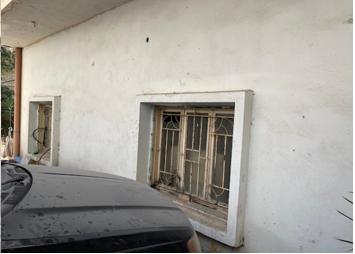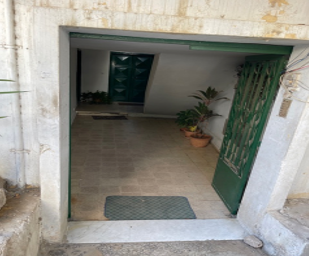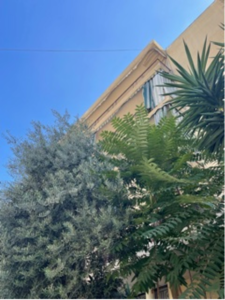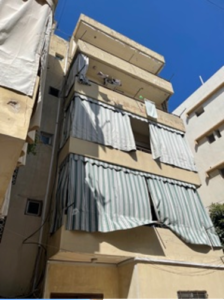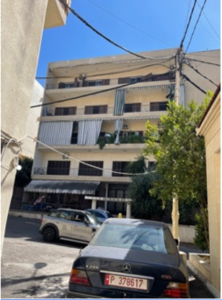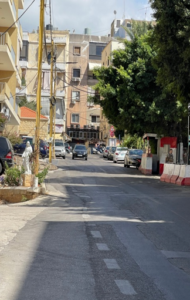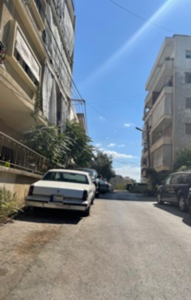Return to Hadath
“ Ya, madame,” he shouted from the third floor balcony. I think I finally heard him the third time around.
“ My grandfather lived here a long time ago,” I reassured him, instinctively knowing what brought him out. “I just wanted to take a photo or two of the old place.”
He nodded and went back inside.
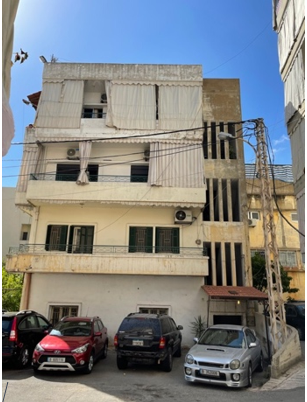
The cul-de-sac is a parking space now. The mess of shrubbery and little hut hiding in its midst at the end of the road is gone. The little fish pool to the side of my grandparents’ ground floor apartment has disappeared too. The broken glass and derelict windows alone tell of abandonment. At first sight, I thought this can’t be the building. Nothing in it jugged my memory. It’s the entrance that convinced me otherwise.
I snapped what photos I could and went home.
The next day, I made it to Pierre Daccache Street.
“Why the photos?” she called out from the second balcony.
“We lived here in the early ‘70s. Just taking photos for my mother,” I reassured her.
“Where are you now?”
“Clemenceau.”
“Come up for coffee, why don’t you?”
I regretted that I was in a bit of a hurry, snapped what photos I could of the old building and its surroundings, and went home.
Our building
In this Arab corner of the world, it’s not unusual for people to get nervous at the sight of someone taking pictures or asking questions. Understandable. We have long been groomed to be prickly by a history fraught with conflict. Our strategic location and wealth in resources have only added to our reticence. It’s quite unnerving being the constant object of curiosity and attention and courting and meddling by “suitors,” local and foreign.
The man and woman of Hadath were right to wonder about the clicks by a stranger.
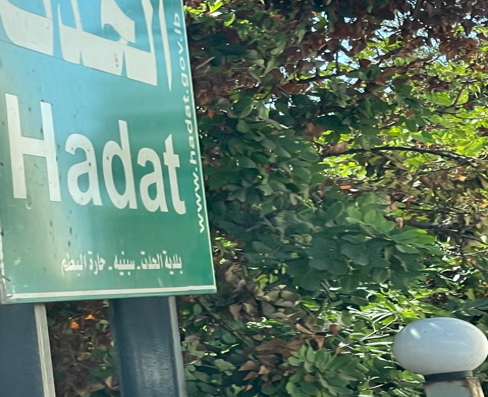
The last time I was here I couldn’t have been older than 13. I write about Hadath this week because I wrote about it in This Arab Life. I could never return to the old neighborhood before, even when writing the book. I don’t like revisiting old geographies that have migrated entirely to memory, much the same way I don’t like returning to retrieve something I accidently left behind, or watching reruns. Inspector Morse is the only one I am happy to rewatch every once in a while.
Share excerpts from the book, some have urged. So, I thought perhaps I might start with Hadath. And hence the return.
It’s still a tidy neighborhood, but there’s a sea of concrete and warehouses in place of the olive tree fields that stood between us and the sea. The old diversities are gone as well. Separations in the name of peaceful coexistence, they call them. As you drive down the Camille Chamoun Highway, to your right are the borders of the Southern Suburbs, to the left Hadath and its environs. Hezbollah’s yellow flags on the right, the Virgin Mary on the left, the highway between them.
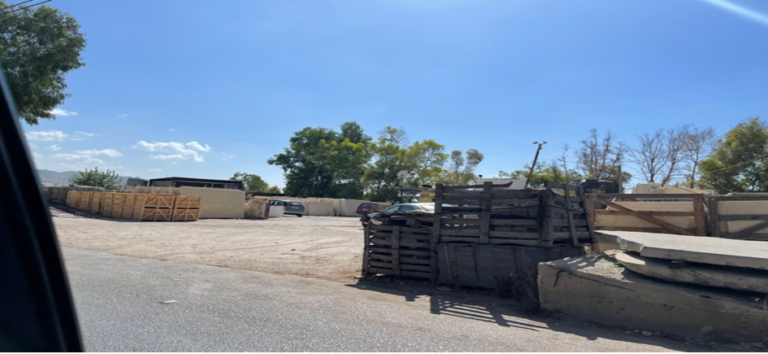
****
From Chapter Seven: The Tourist
…what do I remember of the Lebanon of the 1960s and ’70s, I ask myself? Hardly anything beyond a montage of recollections that shaped an early, terribly vague sense of me and being. I lived here in 1967 and 1970–71. I visited every summer before the war and every once in a while during the fighting. We had an apartment in Hadath, a town toward the southeast of Beirut in the district of Baabdah. It was mainly middle-class Christian, mostly Lebanese. My paternal grandparents and aunts lived 10 minutes away in the three-story building my grandfather built with some help from his children, his end-of-service indemnity, and some savings. It was at the end of the street to the left as you went in, a clay beige color, as if a mock-up. Every twilight, the cul-de-sac turned into an outdoor café for the adults. Laughter and chatter, beer and bizr (sunflower seeds). By 7 o’clock, Tele Liban prepared to take over the night, coiffed presenters in black and white, in sing-song classical Arabic, ushering in Bonanza and Abu Milhem [a folkloric Lebanese show].
My family’s street was uphill. At the top to the left lived Bassam, a Palestinian refugee in a small makeshift house. He’s one of those childhood friends whose perennial gift is to anchor a memory in a time and place and dress it from head to toe in tender sentiment. I cannot think of Hadath without thinking of Bassam. Maybe because he never made it out of my past after 1971. A few years ago, he tracked down Fadi [my brother] in Amman. He had packed up for Canada in the early 1980s, he said, and became an oud player with a music troupe. Michel was another childhood friend—stick thin, weak heart, pants ironed stiff, long-sleeved buttoned up shirt, fine, gelled hair combed sideways. He didn’t make it past ten. Every other week, someone died in Hadath, it seemed, and every so often someone too young. Freak accidents or some such. At the end of our own alley lay an ancient priests’ cemetery. We raided it often for trinkets and thrills. I would stand on the wall as guard while my brother, Bassam, and others jumped in. Once they came back with a derelict door. We liked to believe it was a coffin lid. Down the street we raced on it for weeks, turned now into a cart on iron wheels.
Drunkard Edmond owned the bodega by the entrance of our building. We used to steal gum and chocolates and whatnots from him, open a “pop-up” a few meters away and sell the merchandise to the neighborhood’s children. It was easy to steal from Edmond, with the rolled-up pants, purple blotches, and brown plastic slippers. Eight of us would swarm his tiny shop, a few would distract him while the rest amassed the goods. When my parents came back from a trip to Japan in 1971, they brought us the laugh machine, an electric toy that gave off the sound of a cackling man. We would secretly play it to Edmond, and he would start screaming at us for letting loose chickens in the store.
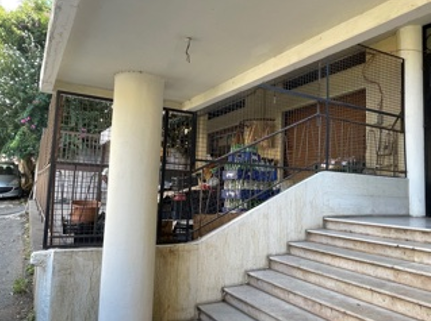
The doctor of the area was Pierre Dakkash. He was also a member of parliament. I would often hear the grownups saying he’s the only clean and decent parliamentarian in the house. I heard that same thing said about him when I came back in 1991. I asked my father today why Hadath? All these years I never asked….
****
On Another Note
Raja Shehadeh, the founder of al-Haq, perhaps the one human rights organization Israel fears most, is a lawyer and author whose passion and expertise are one: Palestine.
In the words of the Guardian’s Rachel Aspden, Shehadeh’s new Book, We Could Have Been friends, my father and I, “wears its power lightly. But his masterly, remorseless selection and accumulation of detail builds an unanswerable case against Palestine’s historic and current oppressors. It also, finally, re-establishes the relationship that is the memoir’s emotional centre of gravity.”
I am truly looking forward to reading the book.
Last week, Peter Beinart interviewed Ariel Koren, who has recently risen to prominence because of her activism within Google against the company’s collaboration with the Israeli state, not to mention its hostility towards all matters Palestinian, which very likely forced her out of the tech giant.
The interview with Beinart, usually accessible only to his newsletter subscribers, “was so powerful” and revelatory about “how frightening it can be to support Palestinian rights in the world of big-tech,” he made it public.
An extraordinarily intelligent and articulate woman, Ariel. The insight she offers about the different group formations at Google and the toxic climate at the company is fascinating. Has Google overreached, and will public outrage force a change in attitude and policy?
Have a listen!

